

OpenGLAM. Open Access Knowledge. 45 Free Online Computer Science Courses. Missed lectures or hate teachers?
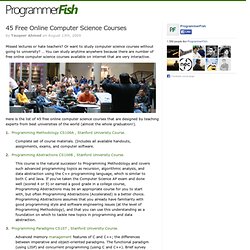
Or want to study computer science courses without going to university? … You can study anytime anywhere because there are number of free online computer science courses available on internet that are very interactive. Here is the list of 45 free online computer science courses that are designed by teaching experts from best universities of the world (almost the whole graduation!). 1. Programming Methodology CS106A , Stanford University Course. Complete set of course materials. 2. This course is the natural successor to Programming Methodology and covers such advanced programming topics as recursion, algorithmic analysis, and data abstraction using the C++ programming language, which is similar to both C and Java. 3.
Advanced memory management features of C and C++; the differences between imperative and object-oriented paradigms. 4. The purpose of this course is to introduce you to basics of modeling, design, planning, and control of robot systems. 5. 6. BAV - Biblioteca Apostolica Vaticana. THE BRITISH LIBRARY - The world's knowledge. The New York Public Library. Category:Data management. From Wikipedia, the free encyclopedia Data management comprises all the disciplines related to managing data as a valuable resource.
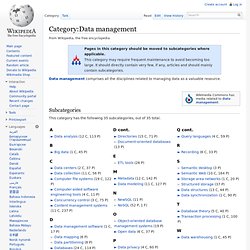
Subcategories This category has the following 35 subcategories, out of 35 total. Pages in category "Data management" The following 200 pages are in this category, out of 284 total. Nezaketozgirin. Computers: Open Source: Open Content: Encyclopedias. A Curator's Tools and To-Do List. Going to a museum is an enhanced content-viewing experience; some of the work it takes to understand and appreciate art has already been done for you.
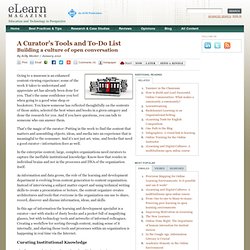
That's the same confidence you feel when going to a good wine shop or bookstore. You know someone has reflected thoughtfully on the contents of those aisles, selected the best wines and books in a given category and done the research for you. And if you have questions, you can talk to someone who can answer them. That's the magic of the curator: Putting in the work to find the content that matters and assembling objects, ideas, and media into an experience that is meaningful to the consumer. And it's not just art, wine, and books that need a good curator—information does as well. English dictionary for learners. Simple Knowledge Organization System. History[edit] DESIRE II project (1997–2000)[edit] The most direct ancestor to SKOS was the RDF Thesaurus work undertaken in the second phase of the EU DESIRE project [1][citation needed].
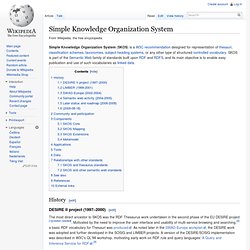
Motivated by the need to improve the user interface and usability of multi-service browsing and searching,[2] a basic RDF vocabulary for Thesauri was produced. As noted later in the SWAD-Europe workplan, the DESIRE work was adopted and further developed in the SOSIG and LIMBER projects. A version of the DESIRE/SOSIG implementation was described in W3C's QL'98 workshop, motivating early work on RDF rule and query languages: A Query and Inference Service for RDF.[3] LIMBER (1999-2001)[edit] SKOS built upon the output of the Language Independent Metadata Browsing of European Resources (LIMBER) project funded by the European Community, and part of the Information Society Technologies programme.
SWAD-Europe (2002-2004)[edit] Semantic web activity (2004-2005)[edit] Knowledge representation and reasoning. Knowledge representation and reasoning (KR) is the field of artificial intelligence (AI) devoted to representing information about the world in a form that a computer system can utilize to solve complex tasks such as diagnosing a medical condition or having a dialog in a natural language.

Knowledge representation incorporates findings from psychology about how humans solve problems and represent knowledge in order to design formalisms that will make complex systems easier to design and build. Knowledge representation and reasoning also incorporates findings from logic to automate various kinds of reasoning, such as the application of rules or the relations of sets and subsets. Examples of knowledge representation formalisms include semantic nets, Frames, Rules, and ontologies. Examples of automated reasoning engines include inference engines, theorem provers, and classifiers. Overview[edit] This hypothesis was not always taken as a given by researchers. History[edit] Characteristics[edit] Classification systems. Classification system (Library science) Classification systems have a long history in library and information science, LIS (cf., Samurin, 1967).
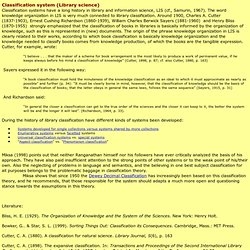
The word knowledge organization in LIS is very much connected to library classification. Around 1900, Charles A. Cutter (1837-1903), Ernest Cushing Richardson (1860-1939), William Charles Berwick Sayers (1881-1960) and Henry Bliss (1870-1955) strongly emphasized that the classification of books in libraries is basically informed by the organization of knowledge, such as this is represented in (new) documents. Figurative system of human knowledge. Schéma de classification. Category:Knowledge representation. Classification schemes.